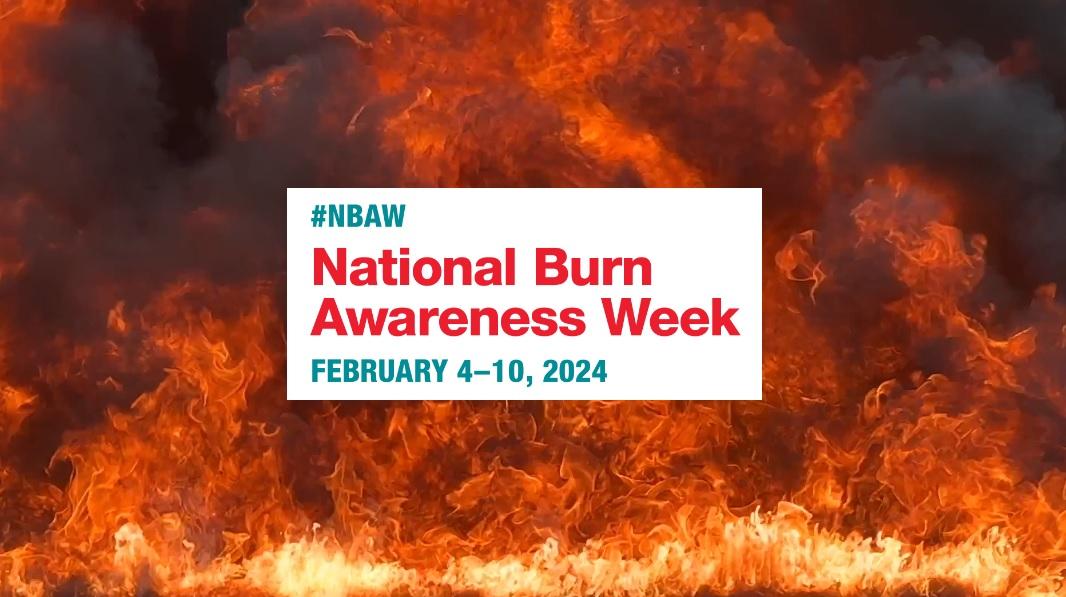Erlanger and the Chattanooga Fire Department are working together to prevent burn injuries in our community during National Burn Awareness Week (February 4-10, 2024). National Burn Awareness Week, an initiative of the American Burn Association, is a collaboration of burn, fire and life safety educators to make the public aware of the frequency, devastation and causes of burn injuries. It also aims to provide measures to prevent these injuries and how to best care for those that are injured.
The theme for 2024 National Burn Awareness Week is Flammable Liquids. Primary hazards associated with flammable and combustible liquids are explosion and fire. Flammable liquids are particularly hazardous due to their ability to produce vapors. This vapor mixes with air and burns quickly when the flammable liquid is heated to its flashpoint or above and is ignited. Flammable and combustible liquids both burn readily and intensively, are explosive under certain conditions, and if not properly contained can spread fire rapidly and uncontrollably. Safe handling and storage of flammable liquids is important.
Here are some safety tips to remember:
- If you spill a flammable liquid, open windows immediately. But don't use fans or other electrical devices, which can be a source of ignition. After cleaning up a spill, take the rag or towel out of the home and dispose of it.
- If you get liquids on your hands, don't wipe them on your clothes or your pants or shirt may become flammable. If your clothing does become contaminated, spot-wash it by hand, then dry it on a line. Avoid using a washer or dryer, which can sometimes ignite the clothing.
- Store gasoline in a UL-approved container at room temperature away from heat sources like your hot water heater or furnace. Also, store flammable solvents like paint thinner and turpentine in tightly sealed containers away from heat sources.
- Don’t spray aerosol cans in a room with a candle or fireplace. In addition, the pressurized cans themselves might explode when overheated, so keep them away from heat sources. An explosion also could occur if a pressurized can is accidentally punctured.
- If you’re starting a campfire or burning brush, never use gasoline or other flammable, combustible liquids to start or accelerate the fire. If your clothes catch fire, stop, drop and roll: Immediately stop what you are doing, drop to the ground and cover your face with your hand before continuously rolling over or back and forth until the fire is out.
Burn injuries continue to be one of the leading causes of accidental death and injury in our nation where tragically, children, the elderly, and the disabled are especially vulnerable to burn injuries, and almost one-third of all burn injuries occur in children under the age of 15.
In the United States, the CDC reports 276,086 people received medical care for treatment of unintentional burn injuries in 2020, with 3,028 deaths from fire and smoke inhalation. Of 87 hospitals reporting to the American Burn Association registry 91,875 people were treated in hospitals for burn-related injuries with 32% of those being for scalds. Compared to the overall population, children under five were two times as likely to be seen for burn injuries at a hospital emergency department. Young adults from 20 to 29 had 1.4 times the risk, and those in the 30-39 age group had 1.3 times the risk of the general population. The primary causes of injury include fire-flame, scalds, contact with hot objects, and electrical and chemicals. Most of the injuries occur in the home. Today, 96.8% of those who suffer burn injuries will survive. Unfortunately, many of those survivors will sustain serious scarring, life-long physical disabilities, and adjustment difficulties.
Significant research and medical advances have dramatically improved burn care and treatment, aided rehabilitation, shortened hospital stays, and increased burn survival rates. Aftercare support for the physical and emotional effects of burns has also played a key role in the successful reintegration of burn survivors into our communities. Furthermore, burn safety education and prevention efforts continue to reduce the number of people who suffer burns each year.
Many people devote their lives and careers to treating, caring for, supporting, and rehabilitating burn injury survivors, including those performing vital work in burn research and development. There are dedicated firefighters who risk their own lives every day to protect others, as well as burn foundations and other life safety professionals who promote burn injury awareness and prevention.
Image

Contact Us
Chattanooga,TN 37406